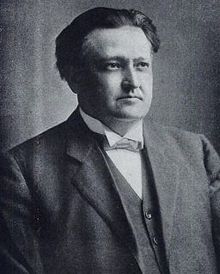Harland B. Howe
| Harland Bradley Howe | |
|---|---|

Harland B. Howe, United States District Court Judge from Vermont
|
|
| Senior Judge of the United States District Court for the District of Vermont | |
|
In office January 31, 1940 – July 31, 1945 |
|
| Judge of the United States District Court for the District of Vermont | |
|
In office February 22, 1915 – January 31, 1940 |
|
| Appointed by | Woodrow Wilson |
| Preceded by | James Loren Martin |
| Succeeded by | James Patrick Leamy |
| Personal details | |
| Born |
February 19, 1873 St. Johnsbury, Vermont, U.S. |
| Died | April 22, 1946 (aged 73) Burlington, Vermont, U.S. |
| Resting place | Saint Johnsbury Center Cemetery |
| Alma mater | Lyndon Institute |
Harland Bradley Howe (February 19, 1873 – April 22, 1946) was a United States federal judge.
Howe was born in St. Johnsbury, Vermont on February 19, 1873, the son of Worcester C. Howe and Rosaline (Bradley) Howe.
He was educated in Caledonia County, and graduated from Lyndon Institute. Originally trained as a harness maker, he contracted polio which left him unable to perform such demanding physical labor. He began to study law with an attorney in Lyndonville, Vermont, and afterwards attended the University of Michigan Law School. Unable to continue his studies after the first year because his funds were exhausted, he returned to Vermont and set up a collection agency in the law offices of Henry C. Bates, and the fees he earned enabled him to return to school. Howe received an LL.B. from the University of Michigan Law School in 1894, passed the bar and became an attorney. He was in private practice in St. Johnsbury from 1894 to 1915.
A Democrat, In 1904 he was an unsuccessful candidate for the United States House of Representatives, losing to Kittredge Haskins. He was a member of the Vermont House of Representatives in 1908. In 1912 and 1914 he was the unsuccessful Democratic candidate for Governor of Vermont, losing to Allen M. Fletcher and Charles W. Gates.
On February 19, 1915, Howe was nominated by President Woodrow Wilson to a seat on the United States District Court for the District of Vermont vacated by James L. Martin. Howe was confirmed by the United States Senate on February 22, 1915, and received his commission the same day. He resided in Burlington after taking his place on the bench, and served until assuming senior status on January 31, 1940. He retired on July 31, 1945, and continued to reside in Burlington.
...
Wikipedia
